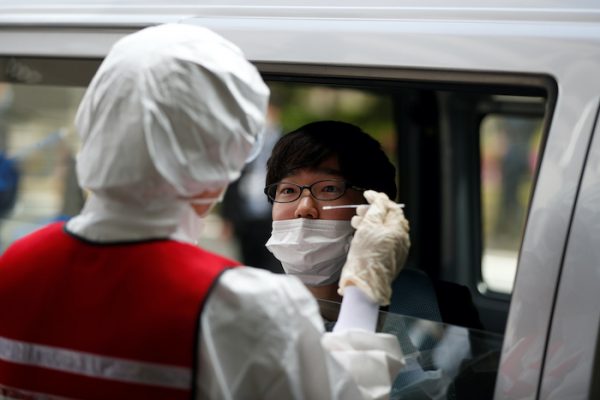After the AIDS epidemic spread worldwide, the UN Security Council adopted Resolution 1308 in 2000 to reaffirm the importance of a coordinated international response to epidemics. During the Ebola epidemic in 2014, a UN summit was convened under the leadership of former US president Barack Obama to establish the UN Mission for Ebola Emergency Response.
The COVID-19 pandemic has seen US President Donald Trump denounce the World Health Organization (WHO) as ‘too political and too close to China’ while China has strongly supported the WHO, transforming it into a political battlefield.
The pandemic is revealing the limited scope of the WHO’s duties and authority, rather than a failure to fulfil its duties. The WHO is obliged to collect information, evaluate situations and give relevant recommendations to member states regarding virus response. The absence of compulsory authority means that the WHO’s duties are ineffective unless member states voluntarily cooperate.
The WHO has been decried for excessively appeasing China, one glaring consequence of its structural limitations. The WHO previously criticised China for its response to severe acute respiratory syndrome (SARS) in 2003, leading to a breakdown in communication between the WHO and China.
A feasible solution to these problems would be to strengthen the WHO’s authority by revising the International Health Regulations (IHRs). In 1981, smallpox was removed from IHR targets following its eradication. In 2005, the target was expanded to include a ‘Public Health Emergency of International Concern’, assuming that bacteriological or chemical terrorism could occur. Flexible revisions of the regulations are necessary to adapt to changes in the international environment. Member states must empirically re-examine the WHO’s authority, especially its early response to COVID-19.
Reforms cannot be left to the WHO alone — it is an international organisation without any authority to act unilaterally. Member states must examine whether the WHO’s authority is adequate, and then create a detailed road map for reform and implementation. Diplomatic negotiations are essential, since many member states oppose the strengthening of the WHO’s authority due to concerns that it may erode state sovereignty.
The United States has led diplomatic negotiations and global solidarity in this field until now. We cannot expect China to assume global leadership either, having come under fierce criticism regarding its Hong Kong National Security Law and its claims in the South China Sea.
In this context, countries that could facilitate negotiations are crucial, including European and Oceanian countries or Japan. These countries have been actively involved in various multilateral frameworks. They led the adoption of a global commitment to combatting COVID-19 at the World Health Assembly held in May 2020 and are engaging in the COVID-19 Vaccines Global Access (COVAX) facility to secure equal access to vaccines. India and Australia — both members of the WHO Executive Committee — are expected to lead reforms in the WHO.
Japan is also expected to play a role in pressuring the United States and China to engage in a multilateral framework. US withdrawal from the WHO may enable China to rise in global health governance. Chinese medicines are, unlike those produced in developed countries, easily accessible for developing countries. If China succeeds in developing vaccines for COVID-19, China’s health influence will increase.
But there is no guarantee that China values norms such as human rights, transparency or the rule of law — values prioritised by the existing governance architecture. Japan’s pressure on China is necessary to maintain and strengthen those norms as the basis for global governance. Should Japan and other countries succeed in this, the United States can be expected to join the governance structure if Joe Biden is elected. Many democratic lawmakers hope that the United States will actively commit to the multilateral framework and to WHO reform.
Even before COVID-19, Japan was prioritising global health in its foreign policy and promoting universal health coverage through a multilateral framework and bilateral assistance. In 2000, Japan hosted the G8 Okinawa Summit, where world leaders agreed to establish the Global Fund to Fight AIDS, Tuberculosis and Malaria. Japan also hosted the G8 Toyako Summit in 2008 which agreed to strengthen health systems internationally, including social health protection, particularly in Africa.
The Japanese government assisted Indonesia and Myanmar to strengthen their health systems and health insurance using Japanese technology, experience and products. In Uganda, a hand-washing campaign was launched in cooperation with a Japanese company that manufactures health and hygiene products. In Japan, people can access treatment regardless of their income level due to public health insurance which explains the relatively controlled number of patients and deaths in the country.
Japan can contribute to solidifying the global response by sharing its system with other countries. Engaging in the existing diplomatic framework, as it does with the US–Japan Alliance and the Free and Open Indo-Pacific strategy, will mitigate COVID-19’s long-term impact, while also preparing the world for the next pandemic.
COVID-19 will have an immeasurable impact on the international community. If inadequately controlled, the world will be laden with poverty, inequality and disharmony. To correct this trajectory, the active commitment of member states is crucial. Expectations for Japanese global leadership have never been higher.
Kayo Takuma is Professor of International Politics in the Department of Law and Politics at Tokyo Metropolitan University.
This article appears in the most recent edition of East Asia Forum Quarterly, ‘Japan’s Choices’, Vol. 12, No 3.

